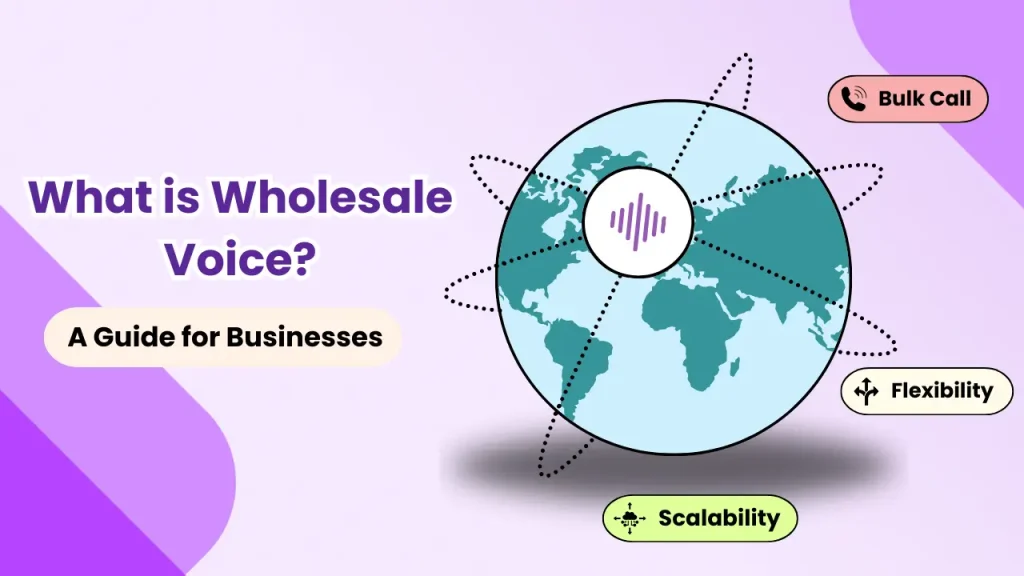Introduction
For businesses aiming to excel, maintaining effective communication with customers and partners is non-negotiable. Voice wholesale services provide a powerful solution, ensuring this critical line of communication remains strong and clear.
When choosing a provider, it is crucial to evaluate key factors such as the quality of service, dependability, and the ability to scale. Partnering with the right provider can equip a business with the necessary tools to gain a competitive edge and successfully reach its objectives.
What is Wholesale Voice?
At its core, voice wholesale is a business-to-business (B2B) model where telecommunication carriers and service providers buy and sell voice traffic (phone calls) in bulk. Instead of a single consumer making a call, a provider buys millions of minutes of call time to various destinations at discounted rates and then resells that capacity to its own customers.
Think of it like a global logistics network for phone calls. A carrier that wants to offer International calling services to its users doesn’t need to build physical infrastructure in every single country. Instead, it can partner with a wholesale voice provider who has already established these complex global interconnections. This allows the carrier to offer seamless global service without the astronomical cost and complexity of building and maintaining its own worldwide network.

Types of Wholesale Voice Services
These services come in various forms, each with its own unique characteristics and benefits. The main types include:
VoIP (Voice over Internet Protocol)
This is the foundational technology that transmits voice calls as data packets over the internet, rather than through traditional circuit-switched networks. It is the bedrock of modern telecommunications, enabling cost-effective, scalable, and flexible voice services. For wholesalers, VoIP is the mechanism that allows for efficient aggregation and routing of global traffic.
SIP Trunking
For enterprises and smaller service providers with their own IP-based Private Branch Exchange (PBX) systems, SIP Trunking provides a digital, high-capacity connection to the public telephone network. It replaces traditional, inflexible Primary Rate Interface (PRI) or analog lines with a scalable, IP-based trunk that can handle voice, video, and data sessions, delivered over the wholesale provider’s robust global backbone. This service is critical for businesses looking to integrate their internal communication systems with the external world efficiently.
TDM (Time-Division Multiplexing)
While largely considered a legacy technology, TDM remains relevant for specific use cases. It involves the transmission of voice signals over traditional copper wires or fiber optic cables using dedicated time slots. While less flexible and more expensive than VoIP, TDM is known for its high quality and reliability, making it suitable for critical applications or for interconnecting with older, non-IP-based networks that are still prevalent in certain regions.
Hosted PBX
Many providers now offer white-label platforms that allow you to sell retail-ready services under your own brand. So, in addition to buying A-Z call termination, you might also purchase wholesale access to services like Hosted PBX and SIP Trunking to resell to your end customers. Understanding the distinction between raw call termination and these platform services is crucial for your business model.
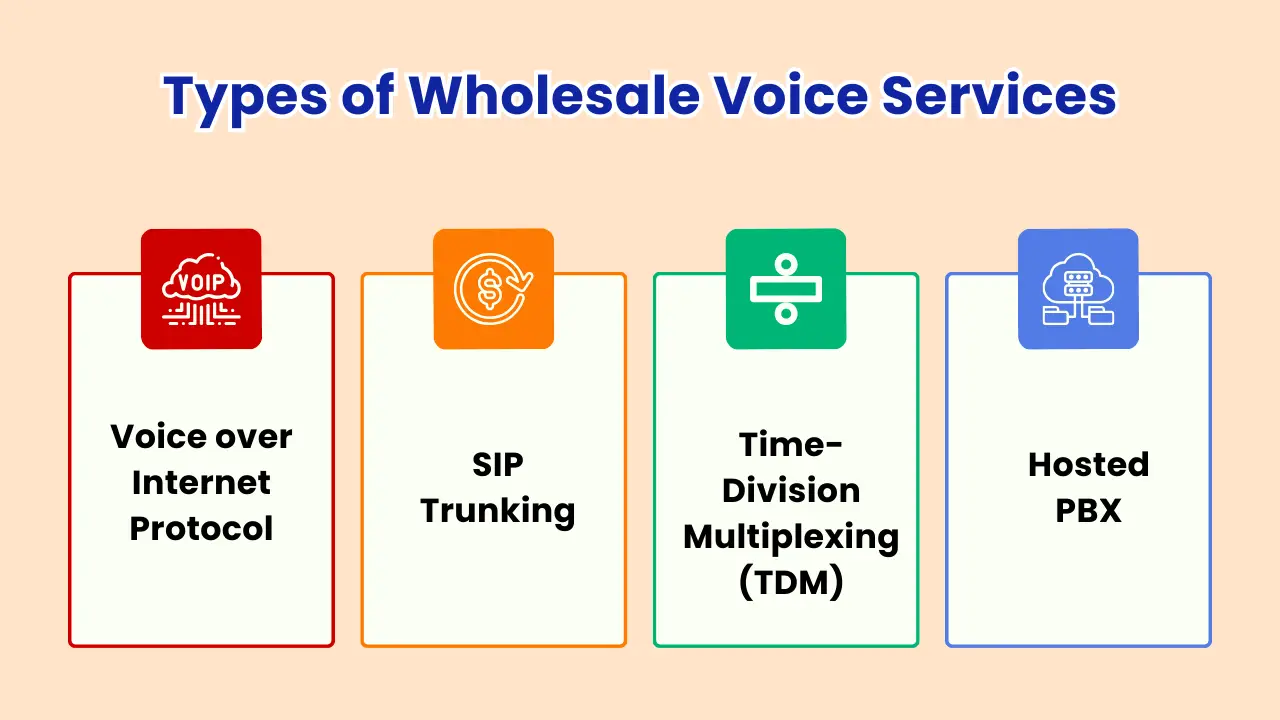
How Does Wholesale Voice Work?
The process of delivering a call via a wholesale network involves a sophisticated, multi-step process designed for efficiency and quality.
Step 1: Network Interconnection
Voice wholesale providers interconnect their networks with other carriers or operators, establishing an extensive network of voice services. This interconnection allows providers to:
- Expand their coverage and reach
- Increase network reliability and redundancy
- Improve call completion rates
- Ensure high-quality service (QoS)
Interconnection methods include:
- Direct peering: Directly connecting two networks
- Indirect peering: Using a third-party network for connectivity
- IPX (IP Exchange): Leveraging a centralized IP exchange platform
Step 2: Voice Traffic Exchange
Providers exchange voice traffic to complete calls across different networks. This exchange includes:
- Call routing: Determining the optimal path for calls
- Call signaling: Managing call setup and disconnection
- Call authentication: Verifying caller identity and permissions
Voice traffic agreements define terms such as:
- Traffic volume commitments
- QoS standards
- Billing and settlement procedures
Step 3: Minute or Channel Purchase
Providers buy voice minutes or channels in bulk from wholesalers at discounted rates. This includes:
- Negotiating pricing and volume discounts
- Choosing specific routes or destinations
- Complying with regulatory requirements
Purchased resources can be:
- Dedicated: Reserved for a provider’s exclusive use
- Shared: Combined with other providers’ traffic
Step 4: Resale to Customers
Providers resell these voice minutes or channels to customers, often bundling them with additional services or features. Resale strategies include:
- Bundling with data or other services
- Offering tailored solutions
- Providing value-added services like call center solutions
Step 5: Call Origination and Termination
When a customer initiates a call, the provider’s network handles its origination and termination using purchased voice minutes or channels. This process involves:
- Call setup: Establishing the connection
- Call routing: Directing the call to the destination network
- Call teardown: Ending the call
Step 6: Billing and Settlement
Providers bill customers for voice services and settle with wholesale suppliers for used resources. This includes:
- Tracking usage and generating invoices
- Managing payment terms and disputes
- Ensuring regulatory compliance
Settlement methods include:
- Bilateral settlement: Direct agreements between providers
- Multilateral settlement: Through a clearinghouse or exchange
Key Components of Voice Wholesale:
- Switching Systems: Handle call routing and network switching
- Gateways: Convert voice signals between network protocols
- Softswitches: Manage call setup, routing, and teardown in VoIP networks
- Billing Systems: Track usage, generate invoices, and handle settlements
By leveraging voice wholesale solutions, providers can navigate the complex voice services market, offering reliable and high-quality solutions without heavy infrastructure investments.
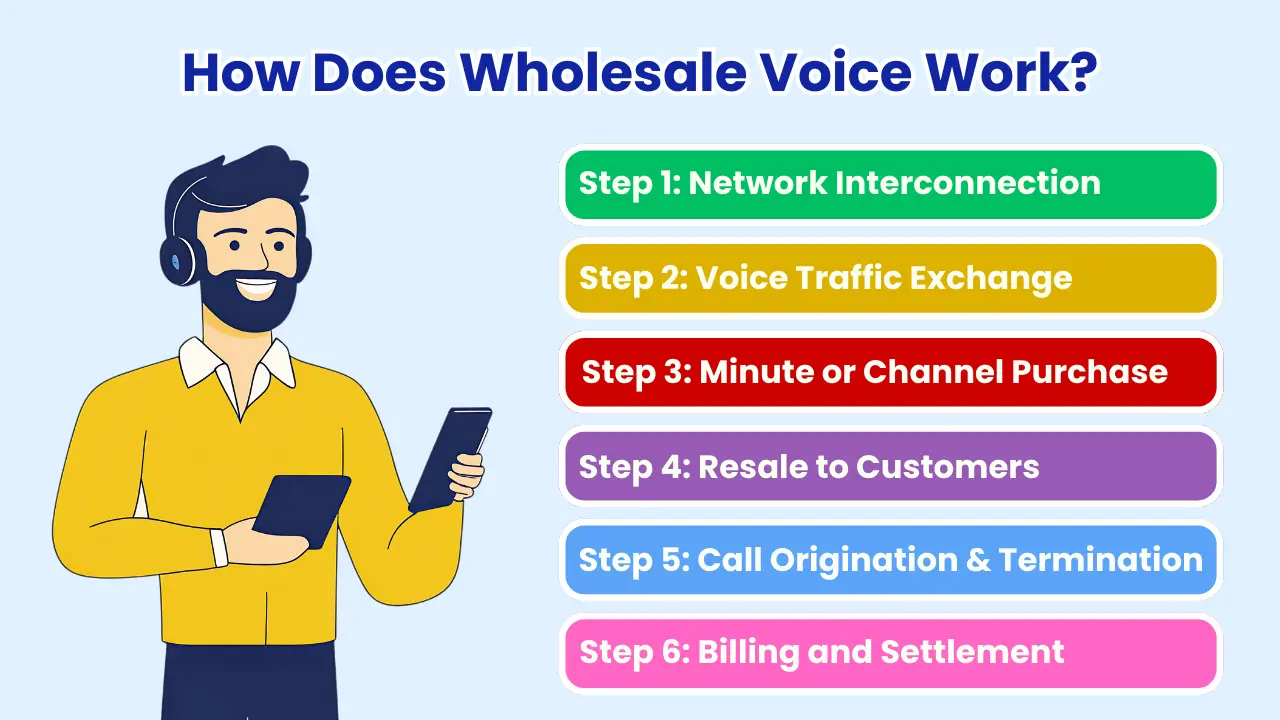
Benefits of Wholesale Voice Services
Wholesale voice services offer numerous benefits for providers and customers alike. By leveraging these solutions, providers can improve operational efficiency, reduce costs, and enhance the overall customer experience, ultimately staying competitive in a rapidly evolving market.
Reduced Costs
In the voice wholesale market, reduced infrastructure investments significantly lower operational expenses and increase profit margins. This allows providers to deliver high-quality services at competitive rates, attracting more businesses to their offerings.
Scalable Solutions
Providers can adapt to changing demands quickly without the need for expensive hardware upgrades or new infrastructure. This flexibility is particularly useful for businesses experiencing variable demands or unexpected usage spikes, ensuring they can scale their offerings effortlessly.
Streamlined Operations
Managing networks becomes simpler in the VoIP wholesale sector, with automated processes and a single point of contact. This streamlined approach enables providers to concentrate on their core operations, improving overall efficiency and enhancing the customer experience.
Reliable Connections
In the voice termination sector, advanced features like call forwarding and voicemail ensure reliable and high-quality connections. These features guarantee minimal downtime or disruptions, providing customers with consistent and dependable communication services.
Customized Services
Providers of voice termination can offer tailored solutions designed to meet specific customer requirements. These services integrate seamlessly with existing infrastructure, allowing businesses to enjoy personalized offerings that align with their unique needs.
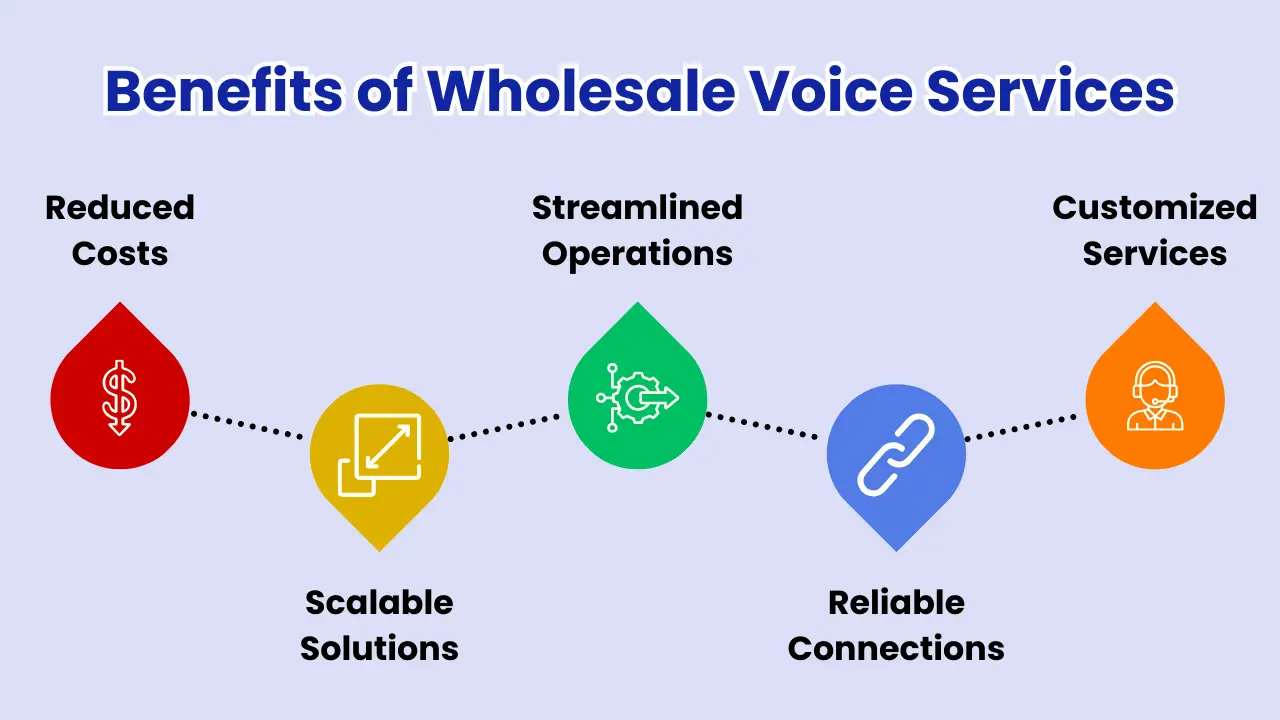
Challenges in Wholesale Voice Services
The telecommunications industry faces several challenges that can impact the quality, reliability, and profitability of voice services. Some of the key challenges include:
Quality of Service (QoS) Issues
Challenges such as network congestion, packet loss, and latency can severely impact voice quality, diminishing the customer experience. Maintaining high-quality voice connections is vital for customer satisfaction, especially in bulk voice termination services where consistency and reliability are essential.
Interoperability and Compatibility
Integrating diverse networks and systems can lead to compatibility challenges, potentially disrupting service delivery. Seamless communication between various platforms and technologies is critical for providing dependable and efficient telecom voice services.
Security and Fraud Risks
Telecommunication networks are often targeted by threats like hacking and toll fraud. In the voice termination sector, deploying advanced security measures is essential to protect networks and prevent fraudulent activities, ensuring trust and reliability for all stakeholders.
Regulatory Compliance
Compliance with industry regulations and standards, including those related to emergency services and customer privacy, is a critical requirement in the voice wholesale market. Failure to adhere to these standards can result in significant legal and financial consequences, making strict regulatory adherence a priority for providers.
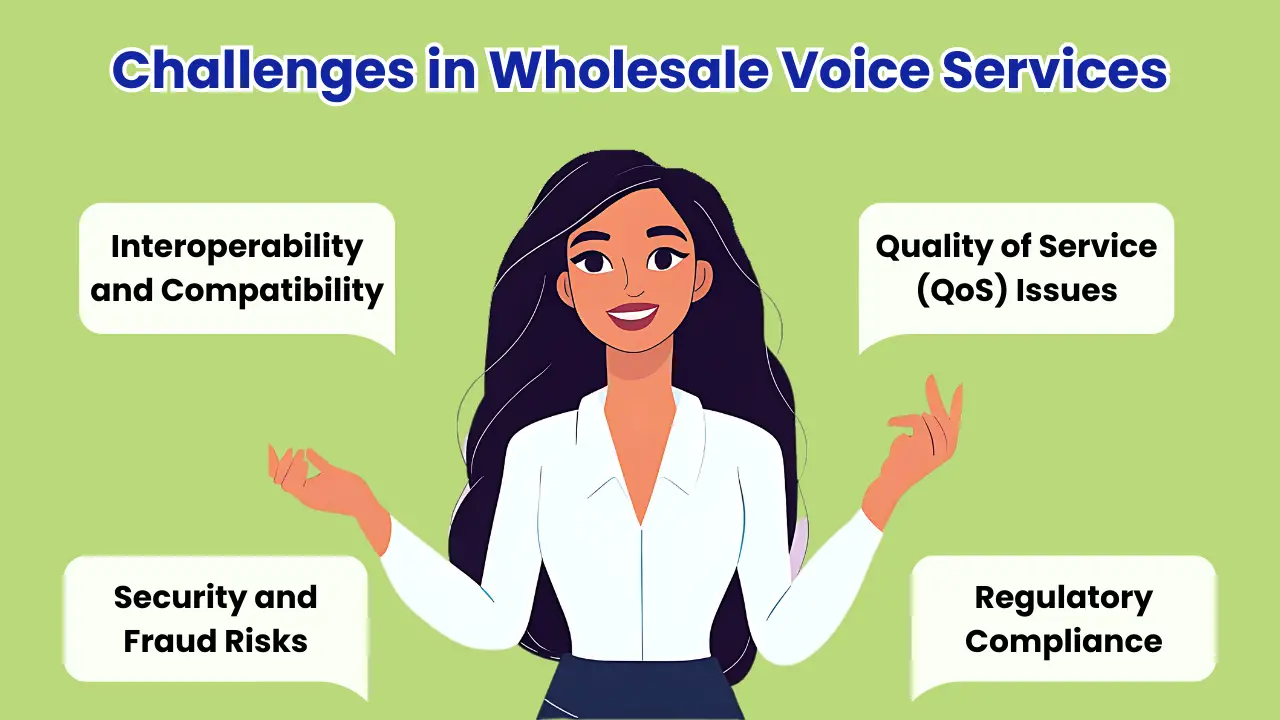
Wholesale Voice Service Agreements
VoIP wholesale service agreements define the terms and conditions between providers and their customers or suppliers, ensuring transparency and consistency in delivering telecom voice services. These agreements play a vital role in maintaining successful partnerships within the VoIP wholesale industry.
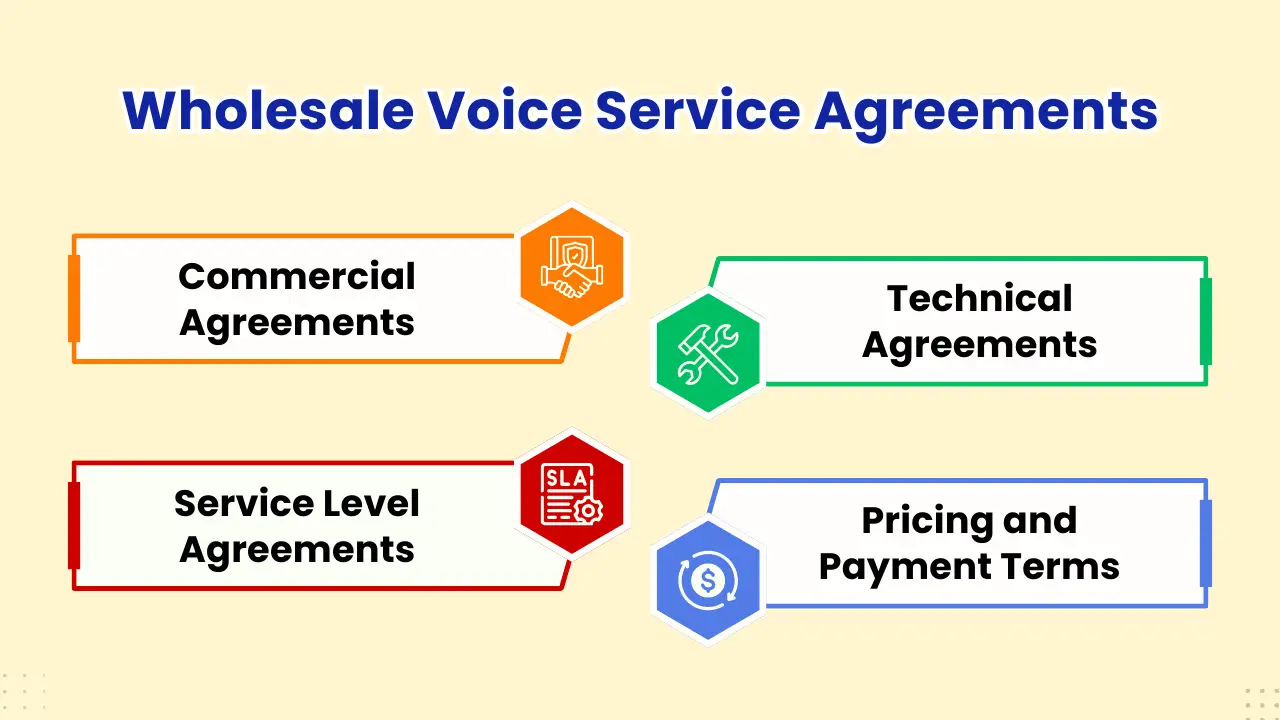
Commercial Agreements
Commercial agreements address the business aspects of the relationship, covering:
- Service scope and duration
- Pricing and payment structures
- Volume commitments and associated discounts
- Termination clauses and penalties
These agreements lay the foundation for a clear and mutually beneficial commercial relationship.
Technical Agreements
Technical agreements specify the technical requirements for VoIP wholesale operations, including:
- Network interconnection and system integration
- Quality and performance standards for services
- Call routing and signaling protocols
- Network security and redundancy measures
These agreements ensure seamless technical compatibility and operational efficiency.
Service Level Agreements (SLAs)
SLAs establish the performance benchmarks and metrics for VoIP wholesale services, such as:
- Service availability and uptime commitments
- Call quality and completion rate expectations
- Network latency and jitter standards
- Mean time to repair (MTTR) for resolving issues
SLAs set clear expectations for quality and reliability, ensuring customer satisfaction.
Pricing and Payment Terms
Pricing and payment terms outline the financial elements of VoIP wholesale agreements, including:
- Pricing models (e.g., per-minute, flat-rate)
- Payment schedules and accepted methods
- Penalties for late payments
- Processes for dispute resolution
These terms guarantee financial transparency and fairness in transactions.
Additional Clauses
VoIP wholesale service agreements may also include provisions such as:
- Confidentiality and non-disclosure agreements (NDAs)
- Compliance with regulatory and legal requirements
- Intellectual property and ownership rights
- Force majeure and dispute resolution mechanisms
By understanding these components, providers in the VoIP wholesale market can negotiate effective agreements that align with their business objectives and foster successful, long-term partnerships.
Selecting the Right Wholesale Voice Provider
Choosing the right provider is a crucial decision for businesses seeking reliable and high-quality voice communication services. As the demand for voice wholesale termination grows, the market has become crowded with providers offering various solutions. To make an informed choice, it’s essential to evaluate several factors that affect the quality and performance of telecom voice solutions.
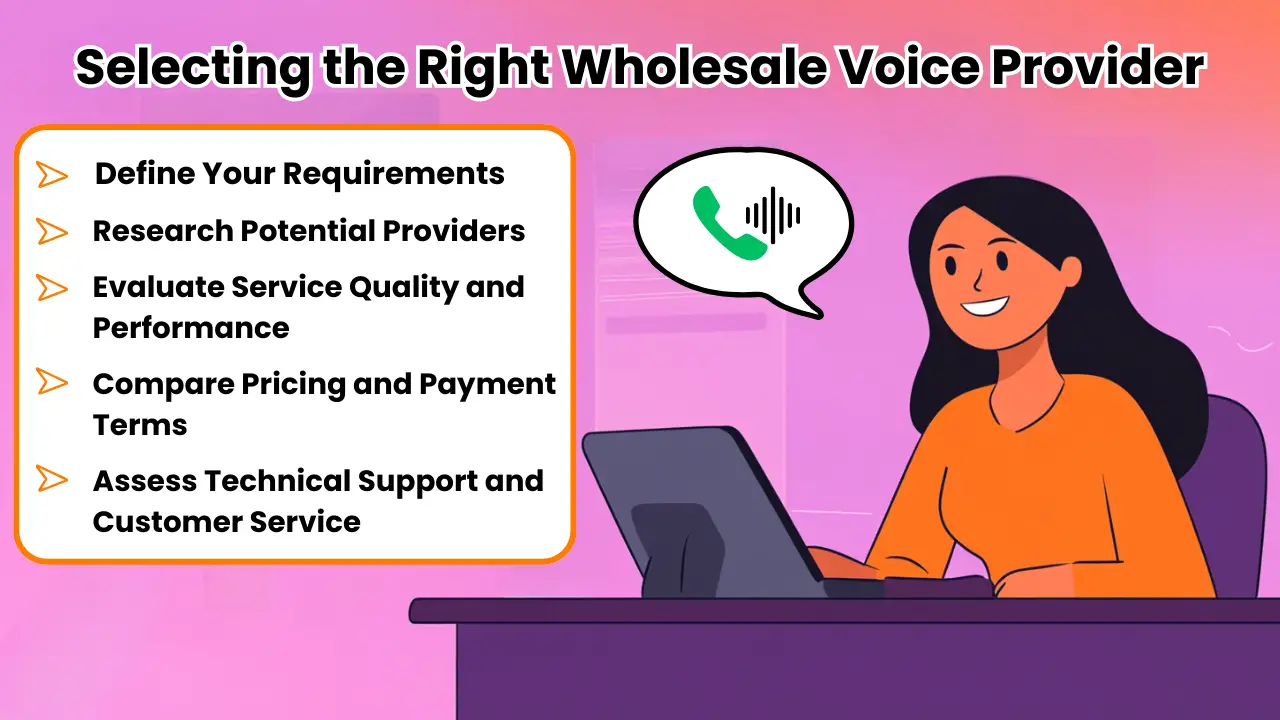
1. Define Your Requirements
Understanding your requirements is key to selecting the ideal provider. Before beginning your search, assess your business needs and goals:
- Identify your specific business objectives
- Determine the type of voice services needed (e.g., VoIP, SIP Trunking)
- Evaluate your network infrastructure for compatibility
Identify your primary business objectives determine the specific types of voice services required and evaluate your existing network infrastructure for compatibility.
2. Research Potential Providers
Conducting thorough research on potential providers is a vital step in the decision-making process. With numerous options in the market, focus on their reputation, experience, and range of services:
- Seek providers with a strong industry reputation and proven experience
- Verify compliance with regulatory requirements and industry standards
- Assess their network coverage and reach
Choosing a reliable voice wholesale termination partner requires diligent research. Review online feedback, ask for referrals, and evaluate their track record in delivering dependable voice services.
3. Evaluate Service Quality and Performance
Assessing service quality and performance is essential to ensure reliable operations. Voice services are integral to business success, and any disruptions can impact customer satisfaction and revenue:
- Review service level agreements (SLAs) and performance metrics
- Assess call quality, completion rates, and network uptime
- Verify certifications (e.g., ISO 9001, ITIL)
Inquire about their Network Operations Center (NOC) capabilities and their processes for proactive network monitoring and issue resolution.
4. Compare Pricing and Payment Terms
Understanding pricing and payment terms helps you find cost-effective solutions for your business. Voice services represent a significant investment, making competitive pricing essential:
- Analyze pricing models (e.g., per-minute, flat-rate) and available discounts
- Review payment schedules and accepted methods
- Check for additional fees or hidden charges
By comparing pricing and payment terms, you can identify a provider whose financial model aligns with your business goals while delivering the best value for your investment.
5. Assess Technical Support and Customer Service
Evaluating technical support and customer service is vital to ensure timely assistance when issues arise. Wholesale VoIP termination services can be complex, and technical problems may occur unexpectedly.
- Assess the provider’s technical support and customer service capabilities
- Review available support channels (e.g., phone, email, chat)
- Evaluate their responsiveness and resolution processes
Understanding the provider’s approach to technical support helps ensure they can handle challenges efficiently. Reliable support is crucial for maintaining smooth operations in wholesale VoIP termination services.
6. Check for Security and Compliance
Ensuring robust security and regulatory compliance is essential to safeguard sensitive business and customer data. Voice services involve handling critical information, making this a top priority.
- Evaluate the provider’s network security measures
- Check compliance with data protection regulations (e.g., GDPR, HIPAA)
- Review business continuity and disaster recovery plans
Providers of wholesale VoIP termination services must demonstrate strong security protocols and adherence to compliance standards. Assessing these factors ensures your data remains secure and services continue uninterrupted during outages.
7. Verify Certifications and Awards
Certifications and awards serve as indicators of a provider’s commitment to quality, security, and innovation. Verifying these credentials helps establish the provider’s credibility and reliability.
- Look for industry certifications (e.g., ISO 27001, SOC 2)
- Review any awards or recognitions they have received
For wholesale VoIP termination providers, certifications highlight their dedication to maintaining high standards, while awards reflect their leadership and innovation in the industry. These factors contribute to a well-informed decision when selecting a provider.
Top 5 Wholesale Voice Providers
Explore the leading providers that cater to your business needs. These top companies offer dependable, high-quality voice solutions with advanced features and competitive pricing, making it easy to find the ideal partner for your telecom requirements.
1. Ringflow
Ringflow stands out for its reliable connectivity and superior call quality, making it a go-to choice for businesses. Their telecom services are tailored to meet the demands of carriers, ISPs, and telecom operators. With a strong focus on VoIP wholesale termination, Ringflow ensures seamless voice communication across networks.
- High-quality voice services
- Reliable connectivity
- Competitive pricing
2. Vonage
A well-known name in the VoIP industry, Vonage offers reliable solutions backed by exceptional customer support. Their services are designed for businesses looking for quality and scalability. With expertise in bulk VoIP termination, Vonage provides solutions that ensure efficient call routing and superior voice quality.
- Reliable VoIP solutions
- Exceptional customer support
- Scalable services
3. My Country Mobile
My Country Mobile delivers affordable and tailored VoIP solutions designed for businesses. Their services emphasize quality and cost-efficiency, ensuring seamless voice traffic termination for carriers and telecom operators.
- Affordable VoIP solutions
- High-quality voice communications
- Competitive pricing
4. Acepeak
Acepeak offers innovative voice wholesale termination solutions with a strong focus on quality, reliability, and scalability. Their services are crafted to address the dynamic needs of businesses and telecom providers, ensuring smooth operations and top-tier performance.
- Innovative voice solutions
- High-quality services
- Scalable infrastructure
5. RingCentral
RingCentral specializes in cloud-based VoIP solutions with advanced features, such as video conferencing and CRM integration. Their services are ideal for businesses looking for flexible and cost-effective voice termination solutions that support modern communication needs.
- Cloud-based VoIP solutions
- Advanced features
- Cost-effective
Conclusion
In conclusion, selecting the right voice service provider is a critical decision for businesses. By considering factors such as quality, reliability, and scalability, businesses can find a provider that meets their needs.
A reliable wholesale VoIP provider can help businesses improve their communication and stay ahead of the competition. It’s essential to do your research and select a provider that aligns with your business goals. By choosing one of the top providers listed above, businesses can ensure they receive high-quality voice communication services that meet their needs and help them achieve success.
FAQ's
Is wholesale voice only for large telecom carriers?
No, voice serves a broad range of businesses, including SaaS companies, contact centers, and any enterprise seeking to reduce costs on high-volume calls.
How does wholesale pricing actually work?
Pricing isn’t just one per-minute rate. It’s a combination of the per-minute cost, the billing increment (per-second vs. per-minute rounding), and fees for channel capacity (the number of simultaneous calls you need).
What is the most important factor for ensuring good call quality?
The most critical factor is using guaranteed CLI (Calling Line Identification) routes. This ensures your real business number is displayed to maintain trust. Non-CLI routes are cheaper but can make your calls appear as spam or “Unknown.”
How can my business protect itself from telecom fraud?
The best protection is a provider with automated fraud management tools. Ask if you can set automatic alerts and blocks for unusual traffic patterns. This prevents hackers from running up devastating charges on your account.
How complex is it to connect to a wholesale provider?
For a business with a technical team, the process is straightforward. Connection is made using the industry-standard SIP protocol. Your team simply configures your system to route calls to the provider, who should offer technical support during onboarding.

